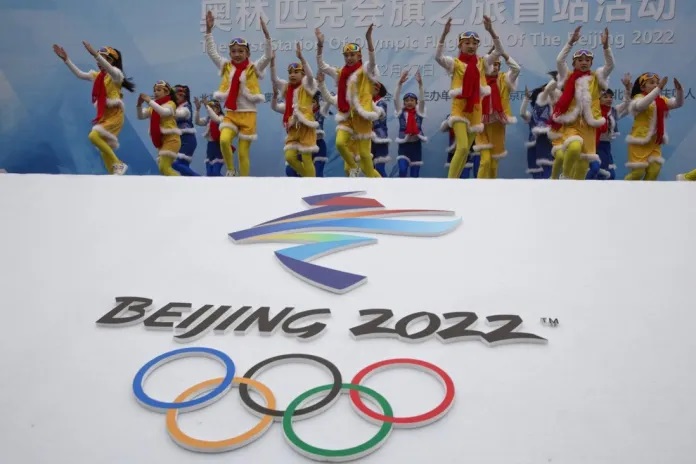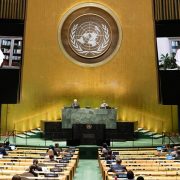
Days before Washington announced a diplomatic boycott of the Beijing Olympics this week, China issued a white paper on democracy describing its own democracy and criticizing the American one.
Two elements possibly tipped the balance for a boycott in the USA, that remained uncertain for months. The first is the public disappearance of tennis player Peng Shuai, ignoring calls from the International Tennis Association to provide information about her whereabouts. Then there was the case of Lithuania, whose exports to China were virtually stopped by Beijing after its recognition of Taiwan, thus ignoring WTO provisions.
To Washington, that meant China is not earnest in adhering to international norms, it can’t be trusted on its pledges, and thus it shouldn’t enjoy a normal Winter Games. This also could make the political atmosphere more toxic. Right or wrong, we are going back to a full-scale Cold War. The first one with the USSR actually took many years to shape up. The pace of this one is much faster, and its contours are different.
In this situation, it would be extremely important not to play up the situation. On the contrary, Beijing could feel obliged to retaliate severely. The Winter Games are China’s face, and this insult ruins China’s face, its pride, so the reaction could be harsh.
This could further complicate everything while its recent white paper on democracy leaves many loopholes.
China’s white paper on democracy says: Democracy is of many types; no country has the patent for it. It is to say, ‘America has no right to judge my democracy’. This is fine but can the concept of freedom that China demands externally deny it internally? If externally no one can deny China’s idea of democracy, can the Chinese Communist Party (CCP) deny internally the various Chinese ideas of democracy? That is, one cannot use one rhetoric externally and then reject the same rhetoric internally. If China wants freedom between countries, it must grant freedom internally; otherwise, it contradicts itself.
It could be more convenient to agree externally with America, on an idea of democracy, and then apply it internally. Otherwise, there are two possibilities: 1) China is in the contradiction of using different concepts for inside and outside 2) if it grants inside the same freedom that it asks for outside China, then as many Chinese have their own ideas of democracy, the country goes into chaos.
If democracy has to do with a locality, China for instance, and it can vary from place to place, then there would be the democracy of Guangzhou, Sichuan, Beijing, and Shanghai. After that, there is the democracy of Beijing’s western district, the eastern district… and so on.
Short circuiting the shortcuts of Chinese characteristics
China did use the concept of “Chinese characteristics” to mark differences between China and other countries. This idea during the Deng period expanded within the country. Each local government gradually moved away from Beijing’s orders by emphasizing the “local characteristics” for which certain central measures could not be applied. But in this way, there was growing confusion, and everything became chaotic.
China defines its democracy as popular and claims that it truly respects and reflects the interests and will of the people. In Western democracies, on the other hand, the interests of the people are hijacked by the interventions of interest groups that seek to put the state at the service of their own particular agendas.
In effect, this points to an enormous weakness in liberal democracies. It has always been there in liberal democracies, but now, particularly after the experience of Trump’s extreme populism denying the outcome of the vote and with the overwhelming power of often monopolistic Internet industries, it is having a much greater prominence and impact.
But unlike the USSR, China is not saying that its model of democracy is superior, better than the liberal one. China says, ‘there are so many democracies, why do Western countries, including America, deny mine?’ This argument is indeed grounded and could be shared.
But in denying the superiority of its own model and denying that the two models are radical alternatives, as the USSR did, it stresses the problem of logic we saw: how does Beijing deny the Chinese the freedom to choose the democracy they want, when the same Beijing claims this freedom from America? That is, the Chinese argument would have traction in the West if the various places in China chose their model of democracy freely. But that’s not the case.
Beijing has put itself in a logical short-circuit, which is essential and existential. The fact that this short-circuit has surfaced in the white paper seems essential and fundamental and reveals deep undercurrents at work under the calm surface and the back-thought of the document’s authors, almost a Freudian slip.
The people who wrote and approved the White Paper do not believe and do not want a totalitarian system for the whole world; they want, at least for now, a global system in which their own system of government can survive and have acceptance. In the future, of course, everything can change, in one sense or another.
But in reality, by not resolving the Freudian slip, the Chinese ideological system puts itself in the worst position of all, between two chairs, neither flesh nor fowl. It is a position of significant ideological instability. Of course, only intellectuals can realize the contradiction, but they are the engine, the great priests of the system. If they struggle to put their thoughts in order, their system of “faith” and trust, everything is more fragile. The government then relies too much on force, which cannot last too long, except at an increasing cost.
The question is, if China declares an ideological war on liberal democracies, as the USSR did, then it will have the problem of having to try to export its system. This had nasty effects on the USSR; it would be much more difficult for China, much less international than the Soviets.
Or it has to come to terms with the Western liberal system, which is also very difficult, but perhaps less so than an ideological war with the West.
Then, another issue. Criticisms presented by China of American democracy are all well-founded and reasonable, but then what? What is the solution Beijing offers Washington? What is the alternative? None. It says, your system doesn’t work, ours does, but then it doesn’t go beyond that to say, you must adopt ours. This reinforces the logical paradox; it doesn’t allay it.
On the other hand, America says, the Chinese system doesn’t work, and China should adopt an approach like ours for its own good. It may be correct; it may be wrong; it may or may not work from a practical point of view. It opens the immense front of how democracy is exported, and if democracy is exportable anyway, but it is a proposal from a logically coherent point of view.
This is all about logic, but there is a logical unspoken reality one must keep in mind. The Chinese tradition has an erratic relationship with logic that is skewed by the ultra-logical doubt of Zhuangzi[1], a third-century B.C. philosopher who demonstrated reliably for the Chinese how logic is not reliable. So rather than logic, the Chinese look to practical results.
Viewed from Beijing, America, for its state of affairs from its infrastructure to its vitriolic politics, is not convincing, and American logic risks looking like cheating. That said, since the Chinese are not crazy, the logic of the Chinese white paper doesn’t work either. Then, from Beijing we are in an objectively difficult situation, but at least we are starting to tackle a real problem.
From Washington, it looks like the opposite. A boycott means that American trust in Chinese pledges and commitments is disappearing and thus also interest in unsubstantiated talks about principles.
In this situation, anything could happen.
[1] See A.C. Graham Disputers of the Tao, 1989, Chuang-tzu, the Inner Chapters, 2001, Reason and Spontaneity republished in 2021






Moreover, as Hmm implies, states among themselves have different rights than individuals within their states, this is not self-evident, it has to be explained as to why. When Confucius argues that the father should behave as a father and the son as a son, the argument is based on a shared understanding of the Rituals of Zhou that at the time prescribed set behaviors for fathers or sons. But the rituals of Zhou were common for all Central Plains of the Under Heaven of those times, it didn’t argue that in one state fathers could or should behave differently from the other state. Here we do not have a shared set of common values, in fact, some Chinese officials argue against such a set of common values. If states have certain rights and individuals have different rights, either 1. all individuals in those states have the same rights, or 2. if different individuals in different states have different rights. Proposition 1 is self-evident, all men are equal and so are their rights, proposition 2 needs explanation. Why are the Chinese to have different rights from Americans, when China as a state wants to have the same right as America as a state? Then, applying this other piece of Confucian wisdom here perhaps creates far more problems than ignoring altogether Confucius. Again, I stand to correction
Hmm makes an interesting point recalling Confucius zhengming, the rectification of names. But let me quote the whole passage, for my own and the reader’s consumption, because surely Hmm knows the Analects by heart. The passage says: 名不正,則言不順;言不順,則事不成;事不成,則禮樂不興;禮樂不興,則刑罰不中;刑罰不中,則民無所措手足。故君子名之必可言也,言之必可行 也. Here Confucius applies one-way logic, and that is how it works. If names are right then speech is consequential etcetera. He doesn’t stop midway saying: this is true for manes but not so for actions. If he uses two logics, one for speech and the other for names, then the argument is useless. It is just a statement: I want this to work like this and you obey it. Then this is the whole point of any argument — inference from a premise to a consequence. One can still apply two logics, one for the state and one for the individual, but then he has to justify and explain why two logics (and not three or four) and why that in this circumstance and the other in another circumstance. Again: lots of explanations that are not in the white paper. To be also practical, and not just theoretical, when in the 1990s Deng’s stressed the Chinese characteristics in building China’s socialism, then as practicality, many local governments stressed their own local characteristics in order to adapt to Beijing’s orders and regulations. The result was a mess. Then, as I humbly see, but I stand to be corrected on a matter of logic, not sinology or anything else, pure reasonability, that the argument of the White Paper no matter how interesting, is faulty from a logical and a practical point of view. This calls for a different approach, otherwise, there will be ideological problems for the government of China. But I’m sure I’m missing a lot. thank you
The Charter of the United Nations does not ask about the way a state organizes its politics and says countries should not interfere in the internal affairs of other countries. As non-Americans we can say that US has a fake democracy, or be polite and silent about the matter, but we do not has a duty to suggest an alternative political disposition for the US or any other country.
Unfortunately US promotes the “International Liberal Rules Based Order” in which it claims the right/duty to interfere in the internal affairs of any country it wants to give an other regime. In 1968 I protested against the Breznev Doctrine. The “International Liberal Rules Based Order” goes much further than the Breznev Doctrine and has let to the destruction of many countries and many hundreds of thousands of people and deserves to be rejected by all countries. Unfortunatrly US still has many satellites and client states.
Is Sisci a sinologist or not a sinologist? It’s been pretty clear in Chinese philosophical concepts that the different relationships require different duties and rights. A father has different rights and duties than the son. The relationship between nations may be different from the relationship between state and citizen. And Surely Sisci should recall ideas such as zhengming. That a nation is a nation. And that a person is a person. These entities and terms are in no way the same and have different characteristics.